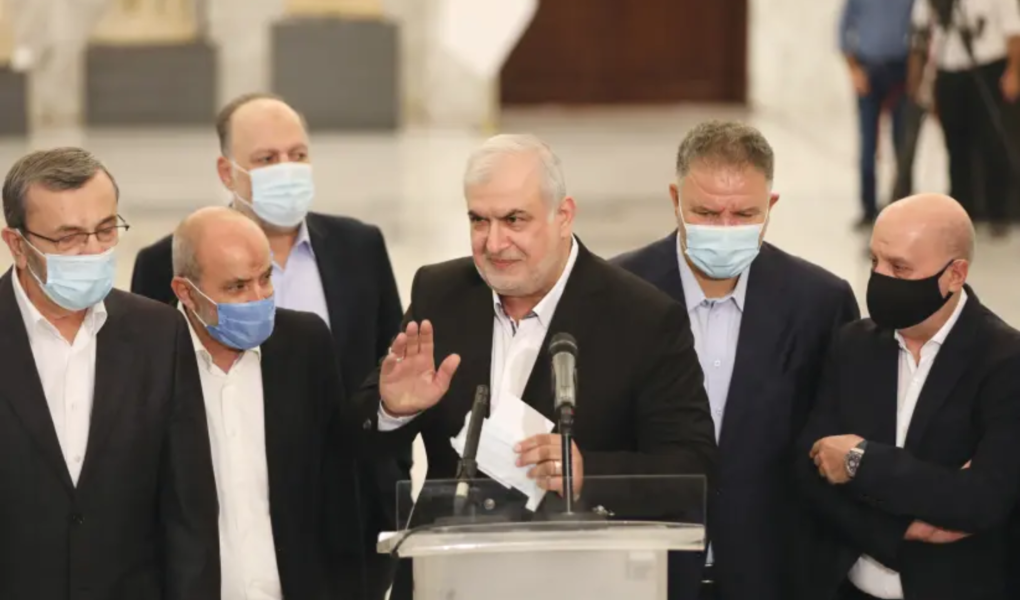Slovenia recently joined a growing band of European governments that have fully recognized Iran’s foremost proxy group, Hezbollah, as a terrorist organization. The designation – the latest announced by a member of the European Union, which currently only partially bans Hezbollah – emphasizes both the progress made in exposing the threat of Iran-backed terrorism, and the continued urgency for Washington and Brussels to hold the regime and its proxies to account.
Slovenia’s decision follows those of several European counterparts that have already moved to comprehensively blacklist Hezbollah, most notably Germany and the United Kingdom, and brings their policies in line with the United States, Canada, Japan, Israel, the Arab League and some Latin American countries. Yet the seemingly indisputable admission that Hezbollah is a terrorist organization unfortunately still faces resistance in important quarters. In 2013, the EU finally banned the Iranian proxy’s “military wing,” but stopped short of proscribing its “political wing.”
Most EU member states have since relied on this incomplete designation, with the foreign minister of Spain acknowledging just last week that her country does not outlaw Hezbollah’s “political wing” because the EU does not. This unfortunate permissiveness has enabled Hezbollah to recruit, raise funds, and propagandize on foreign soil, with critical implications. One Israeli official stated last month that donations made to ostensible humanitarian, educational and welfare programs “still make up 30% of Hezbollah’s budget.”
The artificial distinction between Hezbollah’s wings rests on a long-debunked narrative that the Shi’ite group is not unified – a fallacy Hezbollah itself derides but that nonetheless grants it a veneer of legitimacy. It is a stunning concession offered to an organization that at Iran’s direction bombed a Jewish community center in Argentina in 1994, killing 85 people and wounding hundreds. In 2012, on the 18th anniversary of the atrocity, Hezbollah blew up a bus full of Israeli tourists in Bulgaria. A pregnant woman and five others were among the dead, while more than 30 others were wounded. That year, Iran and Hezbollah were also linked to plots against Israeli or Jewish targets in Thailand, India, Georgia, Azerbaijan, Kenya and Cyprus.
Hezbollah and other organs of Iranian terrorism have only continued plotting attacks. Indeed, an Iranian diplomat recently went on trial in Belgium for allegedly plotting to bomb a dissident rally in France. Yet perhaps the most damning examples of their malfeasance can be found in the Middle East, where Iran has played a pivotal role in fomenting chaos and exacerbating sectarian divisions.
Since Hezbollah launched a war by abducting and killing Israeli soldiers in 2006, the group has amassed a stockpile of some 130,000 rockets and missiles in Lebanon, which it seeks to convert into precision-guided munitions with Iranian support. This arsenal has predictably drawn Israeli concern, risking the outbreak of conflict in a country already ravaged by the corruption that empowers Hezbollah. At Iran’s behest, the group also came to the aid of Syrian President Bashar Assad as he stood accused of deploying chemical weapons, and extended support to Houthi insurgents in Yemen and Shi’ite militias in Iraq – themselves an important part of Iran’s web of clients and proxies.
Iran sustains this network in order to reshape the regional power structure in favor of its own imperialistic ambitions. It notably includes Sunni groups such as Hamas and Palestinian Islamic Jihad, reflecting a streak of pragmatism by the Shi’ite regime in Tehran that seeks to portray itself as a bulwark against Sunni jihadists while tolerating them when interests overlap. Indeed, recent reports about the assassination in Tehran of Abdullah Ahmed Abdullah, an al-Qaeda operative indicted over his alleged role in the 1998 US Embassy bombings, once again raised questions over Iran’s harboring of al-Qaeda leaders.
There is a clear reason why the United States has labeled Iran a leading state sponsor of terrorism for decades, and why it is vital for the incoming administration of President-elect Joe Biden to remain focused on countering the long arm of Tehran. This is particularly relevant if Washington re-enters the 2015 nuclear agreement, which in its current iteration will both legitimize Iran as a nuclear threshold state and grant it much-needed economic relief. As in the past, Iranian military spending can be expected to significantly increase once sanctions lift, making it critical for Washington and European powers to counter any corresponding increase in Iran-backed terrorism their diplomacy brings about.
For the EU, this should include a comprehensive ban on Hezbollah. Such a designation will allow the bloc to maintain relations with Lebanon, as the US, Canada and others have demonstrated, while aligning its policies with stated anti-terrorism commitments. It can also shed further light on the nefarious nature of the Iranian regime, which seeks to depict itself as a victim of unprovoked Western aggression, and signal a much-needed will to stand firm against Iran-backed terrorism.
Shiri Moshe is a senior policy analyst at JINSA’s Gemunder Center for Defense and Strategy.
Originally published in The Jerusalem Post

